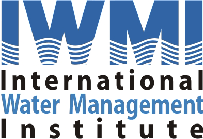December 2008: The International Water Management Institute (IWMI), a member of the Consultative Group on International Agricultural Research (CGIAR), published a policy brief entitled “Water Implications of Biofuel Crops: Understanding Tradeoffs and Identifying Options.” The Brief outlines impacts of biofuel production on water supply and food production, and seeks to provide options for policy makers […]
 December 2008: The International Water Management Institute (IWMI), a member of the Consultative Group on International Agricultural Research (CGIAR), published a policy brief entitled “Water Implications of Biofuel Crops: Understanding Tradeoffs and Identifying Options.” The Brief outlines impacts of biofuel production on water supply and food production, and seeks to provide options for policy makers in addressing resulting tradeoffs.
December 2008: The International Water Management Institute (IWMI), a member of the Consultative Group on International Agricultural Research (CGIAR), published a policy brief entitled “Water Implications of Biofuel Crops: Understanding Tradeoffs and Identifying Options.” The Brief outlines impacts of biofuel production on water supply and food production, and seeks to provide options for policy makers in addressing resulting tradeoffs.
Key findings include: impacts of biofuel production on water, food,
energy and the environment must be considered before implementing
policies supporting biofuel production; biofuel production will
aggravate existing problems in regions where water is already scarce;
water needs for ethanol production depend on local conditions, ranging
from 90 liters of water per liter of ethanol in Brazil to up to 3500
liters in India; and certain biofuel crops such as jatropha trees and
sweet sorghum use less water and are less likely to compete with food
crops.
The brief suggests a number of policy options to reduce the
impact of biofuel production on other uses of water, such as: using
biofuel crops that require less water; growing biofuel crops under rain
fed rather than irrigated conditions; implementing policies to increase
water use efficiency; supporting synergies between biofuel production
and other objectives, such as watershed protection; encouraging new
technologies; and ensuring that biofuel crops have a positive carbon
balance and are produced in a cost-effective manner. [Policy Brief]